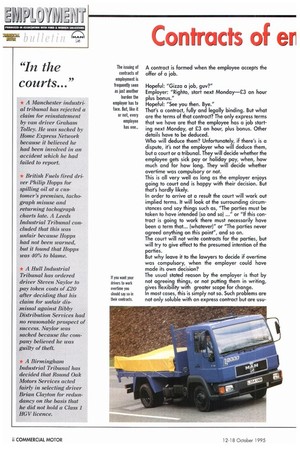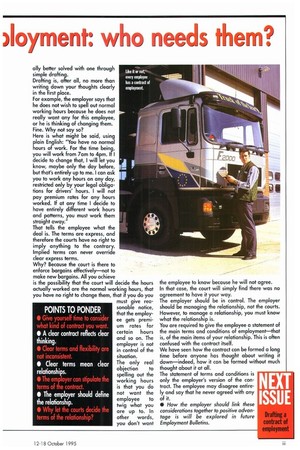C IT] Tads of er )10)/ffiiii 11 1 111 needs the!:
Page 56

Page 57

If you've noticed an error in this article please click here to report it so we can fix it.
A contract is formed when the employee accepts the offer of a job.
Hopeful: "Gizza a job, guy?"
Employer: "Righto, start next Monday—£3 an hour plus bonus."
Hopeful: "See you then. Bye." That's a contract, fully and legally binding. But what are the terms of that contract? The only express terms that we have are that the employee has a job starting next Monday, at E3 an hour, plus bonus. Other details have to be deduced.
Who will deduce them? Unfortunately, if there's is a dispute, it's not the employer who will deduce them, but a court or a tribunal. They will decide whether the employee gets sick pay or holiday pay, when, how much and for how long. They will decide whether overtime was compulsory or not.
This is all very well as long as the employer enjoys going to court and is happy with their decision. But that's hardly likely.
In order to arrive at a result the court will work out implied terms. It will look at the surrounding circumstances and say things such as, "The parties must be taken to have intended (so and so) ..." or "If this contract is going to work there must necessarily have been a term that... (whatever)" or "The parties never agreed anything on this point", and so on. The court will not write contracts for the parties, but will try to give effect to the presumed intention of the parties.
But why leave it to the lawyers to decide if overtime was compulsory, when the employer could have made its own decision?
The usual stated reason by the employer is that by not agreeing things, or not putting them in writing, gives flexibility with greater scope for change. In most cases, this is simply not so. Such problems are not only soluble with an express contract but are usu ally better solved with one through simple drafting.
Drafting is, after all, no more than writing down your thoughts clearly in the first place.
For example, the employer says that he does not wish to spell out normal working hours because he does not really want any for this employee, or he is thinking of changing them. Fine. Why not say so?
Here is what might be said, using plain English: "You have no normal hours of work. For the time being, you will work from 7am to 4pm. If I decide to change that, I will let you know, maybe only the day before, but that's entirely up to me. I can ask you to work any hours on any day, restricted only by your legal obligations for drivers' hours. I will not pay premium rates for any hours worked. If at any time I decide to have entirely different work hours and patterns, you must work them straight away."
That tells the employee what the deal is. The terms are express, and therefore the courts have no right to imply anything to the contrary. Implied terms can never override clear express terms.
Why? Because the court is there to enforce bargains effectively—not to make new bargains. All you achieve is the possibility that the court will decide the hours actually worked are the normal working hours, that you have no right to change them, that if you do you must give reasonable notice, that the employee gets premium rates for certain hours and so on. The employer is not in control of the situation.
POINTS TO PONDER
• Give yourself time to consider what kind of contract you want.
• A clear contract reflects clear thinking.
• Clear terms and flexibility al not inconsistent.
The only real objection to spelling out the working hours is that you do not want the employee to twig what you are up to. In other words, you don't want the employee to know because he will not agree. In that case, the court will simply find there was no agreement to have it your way. The employer should be in control. The employer should be managing the relationship, not the courts. However, to manage a relationship, you must know what the relationship is. You are required to give the employee a statement of the main terms and conditions of employment—that is, of the main items of your relationship. This is often confused with the contract itself.
We have seen how the contract can be formed a long time before anyone has thought about writing it down—indeed, how it can be formed without much thought about it at all. The statement of terms and conditions is only the employer's version of the con tract. The employee may disagree entirely and say that he never agreed with any of it.
• How the employer should link these considerations together to positive advantage is will be explored in future Employment Bulletins.




















































































































